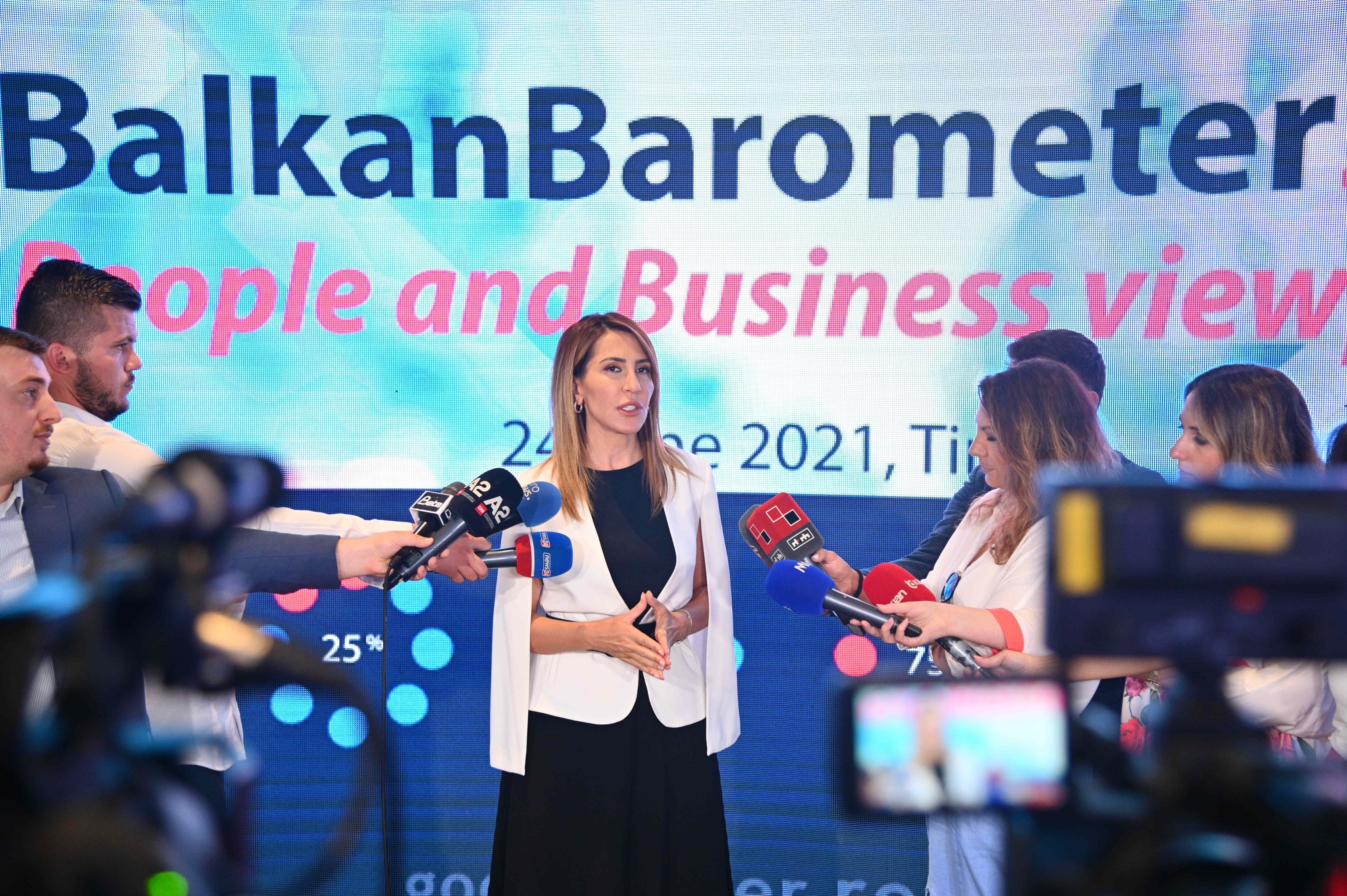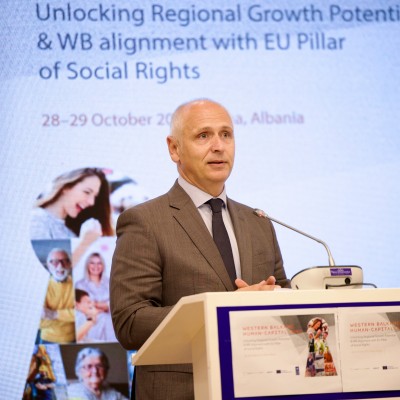Bregu: Balkan Barometer reveals human uncertainty and vulnerability are main concerns followed by some goodish news on benefits of regional cooperation
24 June 2021

Secretary General Majlinda Bregu at the launch of Balkan Barometer 2021 in Tirana on 24 June 2021 (Photo: RCC/Armand Habazaj)
RCC presents 7th edition of Balkan Barometer, annual survey on people and business viewpoints
Tirana – “This, seventh in a row, Balkan Barometer shows human uncertainty and vulnerability are the main concerns followed by some goodish news which is the consciousness about the benefits of regional cooperation. For 49% of Western Balkan citizens, unemployment is the biggest problem, as it is for young people as well, while 46% are most worried about the economic situation. Pandemic shifted opinions and influenced realities. People are more hesitant to leave and work abroad – 37% of citizens would do it – a decreasing trend in comparison with last year,” said Majlinda Bregu, Secretary General of the Regional Cooperation Council (RCC), at the Balkan Barometer (BB2021) presentation in Tirana today.
“As we anticipated last year, a neighbour in need is a neighbour indeed. WB citizens have increased their support to regional cooperation and EU. Balkan Barometer records continued growing support for regional cooperation with 77% of citizens, whilst 69% of businesses see the quality of regional cooperation as important for their business. In the same vein, support for EU integration and accession has significantly increased during the pandemic year, despite the slowness of the enlargement process. 62% of respondents see EU membership as a good thing, as do 66% of businesses. The vast majority of Western Balkan citizens – 73% perceive EU as the most preferred block to trade with, while the Union tops the first place as the most supportive in anti-pandemic efforts by 43% of respondents through medical and financial help – well ahead of China – 14%, Turkey – 9% or Russia – 7%,” added Bregu.
Deputy Head of Unit Western Balkans Regional Cooperation and Programmes at European Commission (DG NEAR) Alessandra Viezzer join the RCC Secretary General Ms Bregu in opening the event, pointing out the importance of this survey for the Western Balkans.
The presentation concluded with the panel discussion moderated by Tim Judah, journalist and author/ Balkans correspondent for the Economist with panellists: Majlinda Bregu, RCC Secretary General, Jim O’Brien, Senior Advisor at Future Europe Initiative Atlantic Council, Vessela Tcherneva, Deputy Director / Head of Sofia office at European Council on Foreign Relations, Corina Stratulat, Head of Programme/Senior Policy Analyst at European Policy Centre, Branimir Jovanovic, Economist at Vienna Institute of International Relations and Gentian Elezi, RCC Consultant on Balkan Barometer 2021 edition from the Albanian Centre for Competitiveness and International Trade (ACIT) talking about the key priorities for a thriving Western Balkans.
“Western Balkan businesses note they will undoubtedly benefit from travelling across the region with ID cards – an agreement being negotiated as part of the Common Regional Market agenda. 61% of respondents support this initiative, as travelling between some of the economies of the region is facing further hurdles. Regional Roaming Agreement has helped almost half of respondents to save money on phone costs (48%). This gives a positive stimulus in the run-up to an important 1st of July milestone – when the roaming charges will be reduced to zero within the region,” said Ms Bregu concluding the event.
More INFO on Balkan Barometer Database, publications, infographics, videos: www.rcc.int/balkanbarometer
***
While originally launched as an attempt to measure impact of regional actions implemented under the South East Europe (SEE) 2020 Strategy, the Barometer is now firmly established as a reliable source of regional data widely employed and referenced by media, business, civil society and decision-makers alike. It remains an independent guide to attitudes towards cooperation and integration, as well as attitudes to other key policy areas both at domestic and regional level that affect the daily lives of the Western Balkan citizens and businesses.
RCC Secretary General Introductory remarks on the occasion of the launch of Balkan Barometer 2021



